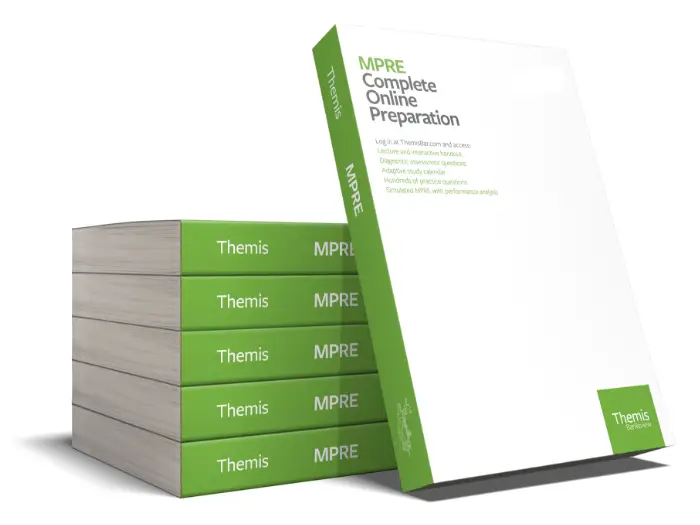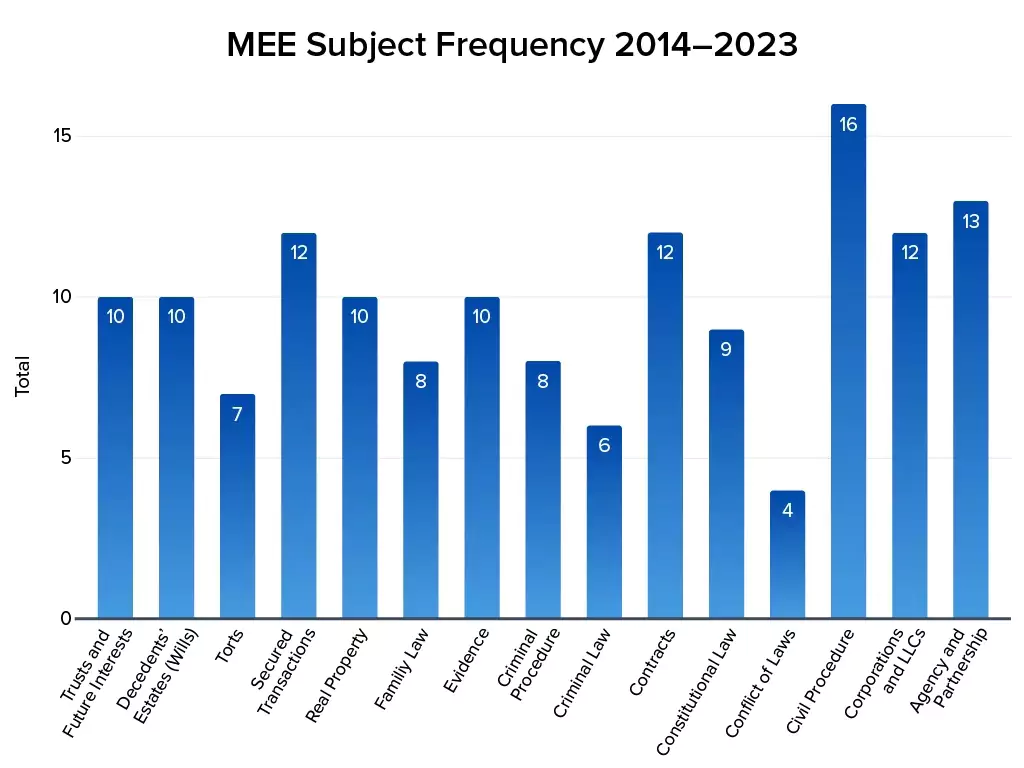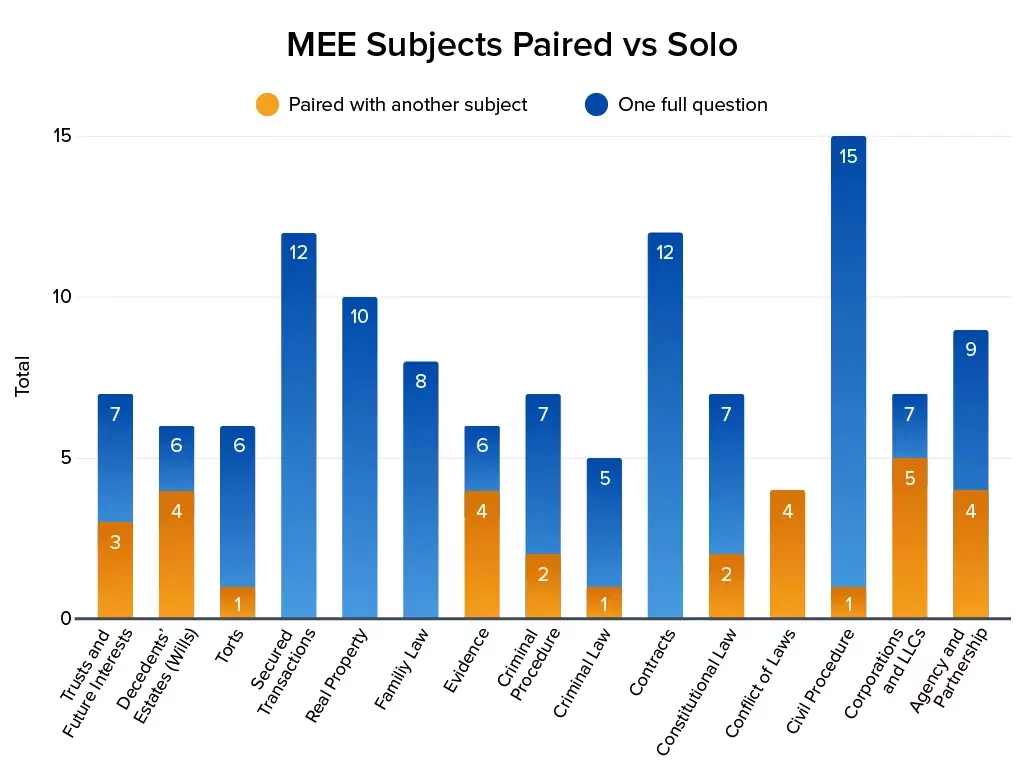MEE Subjects, Topics, and Frequencies
The Multistate Essay Examination (MEE®) is the essay component of the Uniform Bar Examination (UBE®). Your MEE score comprises 30% of your total UBE score. It consists of six 30-minute essays administered over 3 hours on the first day of the bar exam.
Examinees must demonstrate an understanding of fundamental legal principles, communicate efficiently in writing, and apply legal reasoning and analysis to fact patterns. Below, we summarize each subject on the MEE, detail key topics within each, and provide data on the most and least frequently tested MEE subjects.
MEE Subjects
Work with a dedicated attorney essay grader who will grade your essays and provide feedback.

MEE Subject Frequency
The National Conference of Bar Examiners (NCBE®) doesn't release which subjects it will test on any given exam. To prepare, you must study all MEE subjects even though you'll only be tested on a handful. However, the NCBE tests some subjects more frequently, so prioritize accordingly.
Note: See for yourself. The NCBE posts MEE questions and analyses from past administrations.
MEE Subject Frequency 2014-2023
The chart below shows that Civil Procedure has appeared on nearly every MEE for nearly a decade. In contrast, Criminal Law has only been tested 6 times, so it would make more sense to spend more time studying Civil Procedure.
Note: Business Associations is tested as Corporations and LLCs and Agency and Partnerships. Trusts and Estates is tested as Trusts and Future Interests and Decedents' Estates.
MEE Subjects Paired vs. Solo
Sometimes, the NCBE tests MEE subjects together in a single question. Anything is fair game. For example, Conflict of Laws is always tested with another subject, while Real Property is generally tested as a single question. See the chart below for how often subjects are tested alone or paired with another.
Business Associations
Business Associations covers the legal principles pertaining to corporations and partnerships, including their formation, operation, and dissolution. Key topics include:
- The roles and responsibilities of directors and officers
- Shareholder rights
- Issues related to the sale of a business
- The fiduciary duties within a corporation
- The liability that can arise in partnerships.
Business Associations is actually tested as 2 subjects on the MEE—"Agency and Partnerships" and "Corporations and LLCs." You may see these subjects tested separately or together.
Highly tested topics include:
- Duties of Directors and Officers — This is a big one. It covers the duty of care and the duty of loyalty owed by directors and officers to the corporation and its shareholders.
- Piercing the Corporate Veil — Regards when a court might hold shareholders personally liable for corporate debts, which is usually rare and happens only under specific circumstances.
- Vicarious Liability in Partnerships — Understanding how partners can be liable for the actions of other partners.
- Shareholder Rights — Includes voting rights, rights to dividends, and rights in the event of a merger or dissolution.
- Fundamentals of Agency — The principles governing the relationship between agents, principals, and third parties, are especially important in partnerships.
Civil Procedure
Civil Procedure has appeared on the MEE every year since 2014 and is the most frequently tested MEE subject. It covers the rules and procedures that courts must follow in civil cases, including how lawsuits are initiated, the steps involved in litigation, and the principles governing the jurisdiction and authority of courts. Key topics include:
- Personal jurisdictions
- Subject matter jurisdiction
- Venue selection
- Different stages of a lawsuit: pleadings, discovery, trial procedures, and post-trial motions
- Federal-state relations and conflicts, like those involving the Full Faith Credit Clause and the Erie Doctrine
Highly tested topics include:
- Personal Jurisdiction — When a court has the authority over the parties in the lawsuit.
- Subject Matter Jurisdiction — The court's authority to hear the type of case presented.
- Venue and Transfer of Venue — Where a case should be filed and under what circumstances it can be moved.
- Motions (especially Summary Judgment Motions) — Procedures for requesting a court to rule in a certain way.
- Appealability and Final Judgment Rule — What decisions can be appealed and when.
Study with the best practice questions, study guides, and engaging lectures. And the best part is that it's FREE!

Conflict of Laws
Conflict of Laws, also known as Private International Law, is not evaluated independently in the US. It involves cases where the laws of different jurisdictions intersect, including determining which jurisdiction’s laws apply to a case involving cross-border elements. Key topics include:
- Domicile
- Choice of law
- Jurisdiction
- Choice of law
- The recognition and enforcement of judgments from other jurisdictions
The NCBE embeds Conflict of Laws into other MEE topic areas. In other words, there are no stand-alone Conflict of Laws questions. The subject typically appears alongside family law, torts, and contracts, especially where these issues cross state or national boundaries.
Highly tested topics include:
- Choice of Law Rules — Determining which jurisdiction's laws apply to a case.
- Domicile — How a person's permanent home affects legal issues.
- Full Faith and Credit Clause — How and when courts must recognize the laws and judicial decisions of other states.
- Recognition of Judgments — When and how a court will enforce a judgment from another jurisdiction.
- Jurisdictional Issues — Understanding when a court has the authority to hear a case with elements in multiple jurisdictions.
Constitutional Law
Constitutional Law focuses on the interpretation and application of the US Constitution, including the structure of the federal government, the powers and limits of its branches, and the rights and liberties guaranteed to individuals.
- Principles of judicial review
- Federalism
- The application of constitutional principles to modern legal issues
- How constitutional rights are protected
- Conflicts between constitutional rights and governmental interests
Highly tested topics include:
- Individual Rights — Especially First Amendment freedoms like speech and religion.
- Separation of Powers — The division of authority among the executive, legislative, and judicial branches.
- Commerce Clause — Federal power to regulate interstate commerce.
- Equal Protection and Due Process Clauses — Protections against discrimination and unfair governmental actions.
- State Action Doctrine — When constitutional protections apply to actions by state governments.
Contracts and Sales
Contracts covers the creation, interpretation, and enforcement of agreements between parties. Key topics include:
- Formation of contracts
- What happens when there's a breach
- Various defenses to contract enforcement (e.g., duress, fraud, and illegality)
Highly tested topics include:
- Formation of Contracts — The requirements for creating a valid contract.
- Performance and Breach — What constitutes fulfilling or breaking a contract.
- Remedies for Breach — Such as damages, specific performance, and rescission.
- Defenses to Enforcement — Including lack of capacity, duress, misrepresentation, unconscionability.
- Third-Party Rights — Including assignment of rights and delegation of duties.
Criminal Law and Procedure
Criminal Law and Procedure is a staple of the MEE, reflecting its fundamental role in the US legal system. It is tested with moderate frequency, often focusing on the elements of major crimes, defenses, and constitutional safeguards during criminal proceedings.
Criminal Law and Procedure encompasses the legal principles and rules designed to keep the public safe and deter wrongful conduct. About half of the questions in this section will focus on the constitutional rights of those accused of a crime. The other half covers the definitions of criminal offenses, the rights of the accused, and the procedural steps from investigation to trial, sentencing, and appeals. Key topics include:
- Homicide
- Other crimes (e.g., theft, assault)
- Inchoate offenses (attempts, conspiracy, solicitation)
- Defenses to crimes
- Constitutional protections for accused persons
- The process of criminal adjudication
Highly tested topics include:
- Homicide — Differentiating between degrees of murder and manslaughter based on intent and circumstances.
- Mens Rea and Actus Reus — Understanding the mental state and physical act required for a crime.
- Search and Seizure — The limits on law enforcement under the Fourth Amendment.
- Miranda Rights — Ensuring accused persons are aware of their rights under the Fifth Amendment.
- Defenses — Including insanity, self-defense, and duress, which can negate or mitigate criminal liability.
Evidence
Evidence law governs the introduction of evidence presented at civil and criminal trials, specifying what information is admissible to judge the merits of a case. Ensure you answer these questions per the Federal Rules of Evidence, not your jurisdiction's rules of evidence. The presentation of evidence (objections, impeachment, etc.), hearsay, and relevancy make up over 80% of this issue. Key topics include:
- Relevance
- Hearsay and its exceptions
- Character evidence
- Privileges
- The best evidence rule
- Impeachment of witnesses
Evidence is a highly tested area on the MEE, emphasizing its critical role in legal proceedings. Exam questions often revolve around the admissibility of evidence and its impact on trial outcomes.
Highly tested topics include:
- Hearsay and Exceptions — Understanding what constitutes hearsay and when it can be admitted.
- Character Evidence — Knowing when evidence of a person's character is relevant and permissible.
- Impeachment — The process of challenging the credibility of a witness.
- Privileges — Recognizing when certain communications are protected from disclosure in court.
Family Law
Family Law addresses legal issues related to domestic relations and family matters. In most situations, family law is tested independently. However, a Conflict of Laws problem does arise on occasion. Key topics include:
- Marriage and divorce
- Child custody and support
- Adoption and paternity
- Marital property rights
- Domestic violence protection
As with other MEE question types, examiners in the Family Law MEE tend to focus on testing a few key concepts repeatedly. Highly tested topics include:
- Marital Property — How assets and debts are divided upon divorce.
- Child Custody — Determining the best interests of the child in custody arrangements.
- Support Obligations — Establishing financial support for children and sometimes spouses post-divorce.
- Grounds for Divorce — Understanding the legal reasons and procedures for ending a marriage.
Real Property
Land and all tangible improvements to it are the primary focus of real property law. You can expect a question about ownership, rights, contracts, mortgage/security devices, and titles on the MEE. Key topics include:
- Ownership rights and interests
- Land use and zoning
- Easements and covenants
- Landlord-tenant issues
- Sales and financing of real property
Highly tested topics include:
- Ownership and Transfer — How property rights are held and transferred.
- Easements — Rights to use another's land for a specific purpose.
- Landlord-Tenant Law — The rights and duties of landlords and tenants.
- Zoning and Land Use — Regulations affecting property development and use.
Torts
People who have been wronged in some way, whether physically or financially, can often find recourse under tort law. Intentional torts, strict responsibility, product liability, and other torts will make up the other half of the questions in this section (nuisance, defamation, invasion of privacy, etc). In this field of law, the NCBE advises you to assume the following:
- Survival actions and wrongful death claims are available where appropriate; and
- The standards for pure comparative blame and joint and several liability apply unless otherwise stated.
Tort law involves civil wrongs causing harm or injury, where the injured party may seek compensation. It covers:
- Negligence
- Intentional torts
- Strict liability
- Defamation
- Privacy torts
Highly tested topics include:
- Negligence — The duty of care owed, breach of that duty, causation, and damages.
- Intentional Torts — Acts committed with intent to cause harm, such as battery, assault, and false imprisonment.
- Strict Liability — Liability without fault, particularly in cases of abnormally dangerous activities or product liability.
- Defamation — Untrue statements that harm someone's reputation, including libel and slander, and the defenses to these claims.
- Privacy Torts — Including intrusion upon seclusion, public disclosure of private facts, false light, and appropriation of likeness.
Trusts and Estates
The MEE will test your knowledge of trusts and estates twice a year or once every two years. Unlike other subjects, trusts and estates are typically assessed independently. Here are key topics covered in Trusts and Estates:
- Decedents’ estates
- Wills
- Family protection
- Living wills and durable healthcare powers
- Trusts and future interests
Highly tested topics include:
- Wills — Requirements for creating a valid will, modifications, revocations, and challenges.
- Intestate Succession — How an estate is distributed in the absence of a valid will.
- Trusts — Different types of trusts, their creation, and the duties of trustees.
- Fiduciary Duties — The obligations of those who manage another's assets, including loyalty and care.
Secured Transactions
This topic pertains to the portion of the Uniform Commercial Code that regulates security interests in personal property—accepted, with minor adjustments, on a state-by-state basis.
Article 9 governs secured transactions in personal property, outlining the rules for creating and enforcing security interests in movable property, fixtures, and intangibles, such as:
- Attachment and perfection of security interests
- Priorities among competing claims
- Foreclosure and repossession procedures
- The effects of debtor default
Article 9 is a critical subject on the MEE, especially for its application in commercial and financing transactions.
Highly tested topics include:
- Attachment — How a security interest attaches to the collateral.
- Perfection — Steps required to give public notice of the security interest, typically through filing or possession.
- Priority — Determining the order in which competing claims against a debtor's collateral are satisfied.
- Default and Foreclosure — The rights of secured parties when a debtor defaults on an obligation.
Need more proof? We are the only bar review course that publishes our pass rates every year.

Frequently Asked Questions
Which MEE Subjects are the most difficult to learn?
What are the most important topics on MEE?
The most important topics on the MEE are Business Associations, Civil Procedure, and Trusts and Estates. These are, unsurprisingly, those that are tested most frequently.
Which subjects are tested more frequently in the MEE?
The most frequently tested subjects on the MEE are, in order, Business Associations, Trusts and Estates, Civil Procedure, and Conflict of Laws.

